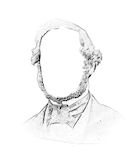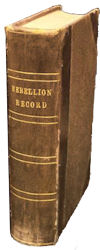June 11th.—Before noon the steamer hauled alongside a stationary hulk at Baton Rouge, which once “walked the waters” by the aid of machinery, but which was now used as a floating hotel, depot, and storehouse— 315 feet long, and fully thirty feet on the upper deck above the level of the river. The Acadia stopped, and I disembarked. Here were my quarters till the boat for Natchez should arrive. The proprietor of the floating hotel was somewhat excited because one of his servants was away. The man presently came in sight. “Where have you been, you ——?” “Away to buy de newspaper, Massa.” “For who, you ——?” “Me buy ’em for no one, Massa; me sell ‘nm agin, Massa.” “See, now, you ——, if ever you goes aboard them steamers to meddle with newspapers, I’m —— but I’ll kill you, mind that!”
Baton Rouge is the capital of the State of Louisiana, and the State House thereof is a very quaint and very new example of bad taste. The Deaf and Dumb Asylum near it is in a much better style. It was my intention to have visited the State Prison and Penitentiary, but the day was too hot, and the distance too great, and so I dined at the oddest little creole restaurant, with the funniest old hostess, and the strangest company in the world.
On returning to the boat hotel, Mr. Conrad, one of the citizens of the place, and Mr. W. Avery, a judge of the district court, were good enough to call and to invite me to remain some time, but I was obliged to decline. These gentlemen were members of the home guard, and drilled assiduously every evening. Of the 1300 voters at Baton Rouge, more than 750 are already off to the wars, and another company is being formed to follow them. Mr. Conrad has three sons in the field, and another is anxious to follow, and he and his friend, Mr. Avery, are quite ready to die for the disunion. The waiter who served out drinks in the bar wore a uniform, and his musket lay in the corner among the brandy bottles. At night a patriotic meeting of citizen soldiery took place in the bow, with which song and whisky had much to do, so that sleep was difficult.
Precisely at seven o’clock on Wednesday morning the Mary T. came alongside, and soon afterward bore me on to Natchez, through scenery which became wilder and less cultivated as she got upwards. Of the 1500 steamers on the river, not a tithe are now in employment, and the owners of these profitable flotillas are “in a bad way.” It was late at night when the steamer arrived at Natchez, and next morning early I took shelter in another engineless steamer beside the bank of the river at Natchez-under-the-hill, which was thought to be a hotel by its owners.
In the morning I asked for breakfast. “There is nothing for breakfast; go to Curry’s on shore.” Walk up hill to Curry’s—a bar-room occupied by a waiter and flies. “Can I have any breakfast?” “No, sir-ree; it’s over half-an-hour ago.” “Nothing to eat at all?” “No, sir.” “Can I get some anywhere else?” “I guess not.” It had been my belief that a man with money in his pocket could not starve in any country soi-disant civilized. I chewed the cud of fancy faute de mieux, and became the centre of attraction to citizens, from whose conversation I learned that this was “Jeff. Davis’ fast day.” Observed one, “It quite puts me in mind of Sunday; all the stores closed.” Said another, “We’ll soon have Sunday every day, then, for I ‘spect it won’t be worth while for most shops to keep open any longer.” Natchez, a place of much trade and cotton export in the season, is now as dull—let us say, as Harwich without a regatta. But it is ultra-secessionist, nil obstante.
My hunger was assuaged by Mr. Marshall, who drove me to his comfortable mansion through a country like the wooded parts of Sussex, abounding in fine trees, and in the only lawns and park-like fields I have yet seen in America.
After dinner, my host took me out to visit a wealthy planter, who has raised and armed a cavalry corps at his own expense. We were obliged to get out of the carriage at a narrow lane and walk toward the encampment on foot in the dark; a sentry stopped us, and we observed that there was a semblance of military method in the camp. The captain was walking up and down in the verandah of the poor hut, for which he had abandoned his home. A book of tactics — Hardee’s— lay on the table of his little room. Our friend was full of fight, and said he would give all he had in the world to the cause. But the day before, and a party of horse, composed of sixty gentlemen in the district, worth from £20,000 to £50,000 each, had started for the war in Virginia. Everything to be seen or heard testifies to the great zeal and resolution with which the South have entered upon the quarrel. But they hold the power of the United States and the loyalty of the North to the Union at far too cheap a rate.
Next day was passed in a delightful drive through cotton fields, Indian corn, and undulating woodlands, amid which were some charming residences. I crossed the river at Natchez, and saw one fine plantation, in which the corn, however, was by no means so good as the crops I have seen on the coast. The cotton looks well, and some had already burst into flower—bloom, as it is called—which has turned to a flagrant pink, and seems saucily conscious that its boll will play an important part in the world.
The inhabitants of the tracts on the banks of the Mississippi, and on the inland regions hereabout, ought to be, in the natural order of things, a people almost nomadic, living by the chase, and by a sparse agriculture, in the freedom which tempted their ancestors to leave Europe. But the Old World has been working for them. All its trials have been theirs; the fruits of its experience, its labors, its research, its discoveries, are theirs. Steam has enabled them to turn their rivers into highways, to open primeval forests to the light of day and to man. All these, however, would have availed them little had not the demands of manufacture abroad, and the increasing luxury and population of the North and West at home, enabled them to find in these swamps and uplands sources of wealth richer and more certain than all the gold mines of the world.
There must be gnomes to work those mines. Slavery was an institution ready to their hands. In its development there lay every material means for securing the prosperity which Manchester opened to them, and in supplying their own countrymen with sugar. The small, struggling, deeply-mortgaged proprietors of swamp and forest set their negroes to work to raise levees, to cut down trees, to plant and sow. Cotton at ten cents a pound gave a nugget in every boll. Land could be had for a few dollars an acre. Negroes were cheap in proportion. Men who made a few thousand dollars invested them in more negroes, and more land, and borrowed as much again for the same purpose. They waxed fat and rich —there seemed no bounds to their fortune.
But threatening voices came from the North—the echoes of the sentiments of the civilized world repenting of its evil pierced their ears, and they found their feet were of clay, and that they were nodding to their fall in the midst of their power. Ruin inevitable awaited them if they did not shut out these sounds and stop the fatal utterances.
The issue is to them one of life and death. Whoever raises it hereafter, if it be not decided now, must expect to meet the deadly animosity which is now displayed towards the North. The success of the South —if they can succeed—must lead to complications and results in other parts of the world, for which neither they nor Europe are prepared. Of one thing there can be no doubt—a slave state cannot long exist without a slave trade. The poor whites who have won the fight will demand their share of the spoils. The land for tilth is abundant, and all that is wanted to give them fortunes is a supply of slaves. They will have that in spite of their masters, unless a stronger power than the Slave States prevents the accomplishment of their wishes.
The gentleman in whose house I was stopping was not insensible to the dangers of the future, and would, I think, like many others, not at all regret to find himself and property safe in England. His father, the very day of our arrival, had proceeded to Canada with his daughters, but the Confederate authorities are now determined to confiscate all property belonging to persons who endeavor to evade the responsibilities of patriotism. In such matters the pressure of the majority is irresistible, and a sort of mob law supplants any remissness on the part of the authorities. In the South, where the deeds of the land of cypress and myrtle are exaggerated by passion, this power will be exercised very rigorously. The very language of the people is full of the excesses generally accepted as types of Americanism. Turning over a newspaper this morning, I came upon a “card” as it is called, signed by one “Mr. Bonner,” relating to a dispute between himself and an Assistant-Quarter-Master-General, about the carriage of some wood at Mobile, which concludes with the sentence that I transcribe, as an evidence of the style which is tolerated, if not admired, down South:—
“If such a Shylock-hearted, caitiff scoundrel does exist, give me the evidence, and I will drag him before the bar of public opinion, and consign him to an infamy so deep and damnable that the hand of the Resurrection will never reach him.”










